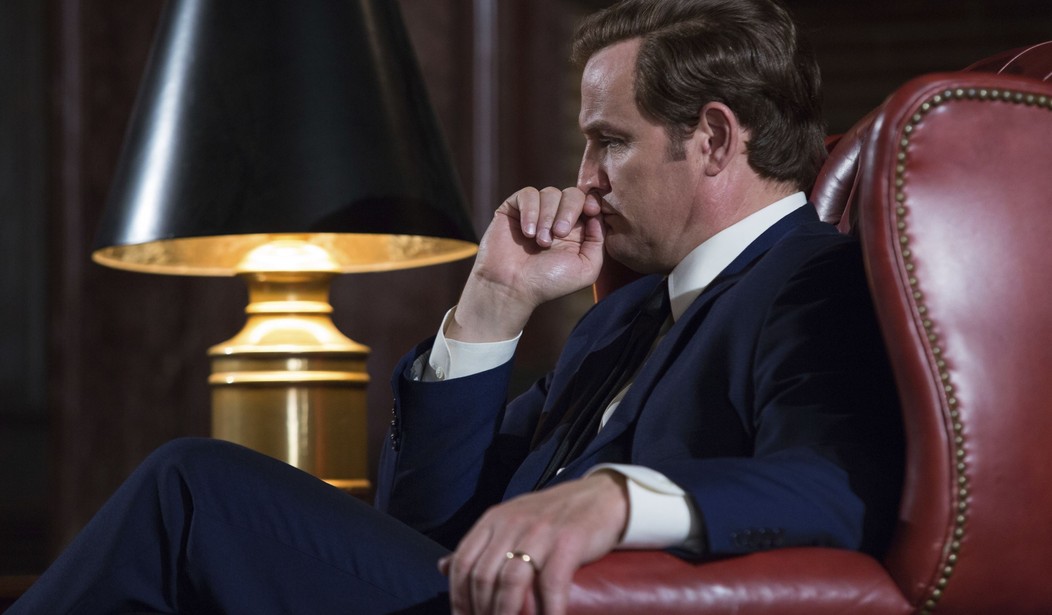
For anyone worried about the future under the leadership of the millennial generation, take heart: there is hope.
The new film “Chappaquiddick”, detailing Sen. Ted Kennedy’s 1969 Martha’s Vineyard car accident that led to the death of a young woman he left at the scene to drown, proves it.
At a Thursday night screening of the film (organized by The Federalist) in Washington, D.C., Executive Producer Mark Ciardi was on hand and took questions following the viewing from a room full of writers and journalists — and very probably a room full of people not forgiving of the events of that fateful weekend just before Kennedy’s brother, JFK, landed men on the moon (which is a key plot element in the film).
Ciardi said the screenwriters were two young men in their late 20s, early 30s who had never heard the Chappaquiddick story but were intrigued when Bill Maher mentioned it as a defining moment in American politics.
The production notes go further:
Screenwriters Taylor Allen and Andrew Logan, who both grew up in Dallas where John F. Kennedy was assassinated in 1963, had a strong emotional connection to the Kennedy family, long before their 2015 screenplay landed on the Blacklist. Living there, the tragedy in Dealey Plaza was impossible to ignore and it sowed a lifelong curiosity about the Kennedys’ Camelot. However, neither had ever heard about CHAPPAQUIDDICK.
While watching Real Time with Bill Maher in 2008 Hillary Clinton had just lost to Barrack Obama and Bill commented that it was because of Ted Kennedy’s endorsements of Barrack Obama that he unexpectedly beat Hillary for the nomination and then what he said next, instinctually just grabbed us: Ted Kennedy has changed presidential history because, if hadn’t been for Chappaquiddick, he would have been president in 1972 and it changed the course of presidential history.
Taylor was 28 and knew he was a pretty smart guy and well educated. How could something seemingly so important, been absent from the conversations about the Kennedys.
The more we learned, the more this story unfolded with layers of intrigue, and the implications were wide ranging.
And the story they tell is a subtle examination of a very privileged man-child, lost somewhere in the shadows of his older brothers. (Paraphrasing: “Joe Jr. was the favorite, Jack was the charming one, Bobby was the brilliant one,” Teddy tells his monstrous, dying father Joe Sr. as he tries to reassure the patriarch he can handle the situation of the girl he left to die. Joe Sr., played by the always brilliant Bruce Dern, expresses — to put it mildly — an opposing opinion.)
There’s not an anachronistic moment in the film — everything is meticulously recreated, right down to the awkward dancing of the very uppercrust, regatta sailing, children of the uber-privileged of the late 1960s as they enjoy a beachside reunion of those who had worked on the recently deceased Robert Kennedy’s presidential campaign, cut short as it was by an assassin’s bullet.
At the party are former secretaries of Bobby’s, known as “The Boiler Room Girls”, a crew as dedicated to the Kennedy family as the nation was at the time. And among them is the brilliant, and perhaps a little broken by the cynicism of politics, Mary Jo Kopechne.
The events that follow are told with a firm yet sensitive hand — something Teddy Kennedy could have used from his own father — leading to a presentation of Mary Jo’s death for what it was: an abandonment and likely suffocation. She is thought to have survived for an hour or more trapped in an air pocket, while Teddy ran around town formulating an alibi and asking everyone else to clean up his mess.
A great deal of credit should be given Australian actor Jason Clarke for masterfully managing to make Teddy both bumbling and foolish, and then arrogant and bullying in the next breath, most especially to his cousin Joe Gargan. Joe, who was like a brother to the Kennedy sons, is also the entitled Teddy’s fetch-it boy; a character who tries valiantly to be the moral compass Teddy claims he wants, but who, in the end, is little more than the holder of the cue cards Kennedy uses to deliver his nationally televised speech wherein he plays the victim of Chappaquiddick.
Gargan broke ties with the Kennedy family following the events at Chappaquiddick. Kennedy, as we know, became “The Lion of the Senate,” one of the longest serving Senators in the history of the nation.
Yet these burgeoning millennial screenwriters never knew of the death of a brilliant young lady called Mary Jo due, at the very least, to the negligence of a likely drunk Ted Kennedy.
But they included a line in the film that showed they got the story of Chappaquiddick. Toward the end of the film, the line is delivered by Gargan and summarizes the entitlement of a man raised to the purple, who could somehow rationalize the death of a young woman — who may have been saved had he not broken down like a child in despair upon realizing what he had done — and proves the upcoming generation understands a Teddy Kennedy, last of the mythical Kennedy brothers.
Gargan, pleading with Teddy to resign during his live television appearance, says the words, “This is not about opportunity, it’s about integrity.”
Kennedy was unconvinced. But the makers of Chappaquiddick were not. Their film, in attempting to relay the sad complexities of what happened at Chappaquiddick that weekend, has more of the latter.













Join the conversation as a VIP Member